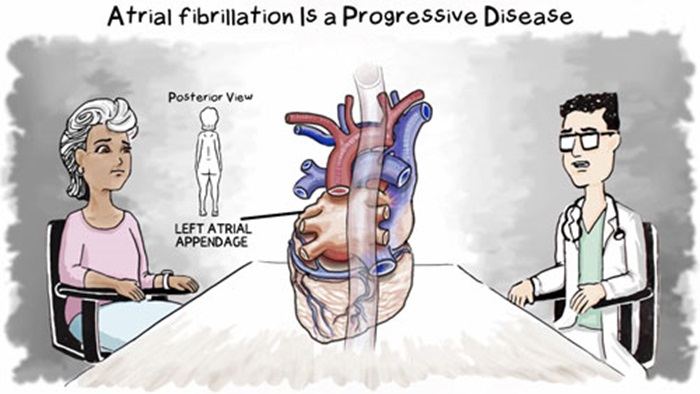Atrial fibrillation (AF) is a common heart rhythm disorder that affects millions of people worldwide. It is characterized by an irregular and often rapid heartbeat, which can lead to various complications, including stroke and heart failure. Many individuals diagnosed with AF are understandably concerned about how this condition may impact their life expectancy.
This article aims to explore the relationship between atrial fibrillation and life expectancy, examining the factors that contribute to mortality in AF patients and the advancements in treatment that have altered prognoses over time.
What Is Atrial Fibrillation?
Atrial fibrillation occurs when the electrical signals in the heart become disorganized, causing the upper chambers (atria) to quiver instead of contracting effectively. This irregular rhythm can result in inadequate blood flow to the body and can lead to blood clots forming in the heart. If a clot travels to the brain, it can cause a stroke, which significantly increases the risk of mortality.
Prevalence And Risk Factors
AF is prevalent among older adults, affecting approximately 8% of individuals aged 65 and older in the United States. The condition can occur due to various factors, including high blood pressure, heart disease, diabetes, and lifestyle choices such as smoking and excessive alcohol consumption. Genetics also play a role; individuals with a family history of AF may be at higher risk.
Theoretical Basis for Life Expectancy Reduction
Mortality Rates Associated with Atrial Fibrillation
Research indicates that atrial fibrillation is linked to increased mortality rates compared to individuals without the condition. Studies have shown that patients with AF experience a 50% to 90% higher risk of death than those without it.
The Framingham Heart Study highlighted that individuals diagnosed with AF could expect an average loss of life expectancy ranging from 2 to 2.9 years depending on various factors.
SEE ALSO: How Common Is Arrhythmia in The Us
Complications Related to Atrial Fibrillation
Stroke: AF significantly elevates the risk of stroke—approximately four times higher than in individuals without AF. Strokes resulting from AF tend to be more severe and can lead to long-term disability or death.
Heart Failure: Over time, persistent AF can weaken the heart muscle, leading to heart failure. Heart failure is a serious condition that can drastically reduce life expectancy.
Other Cardiovascular Issues: Patients with AF are at increased risk for other cardiovascular complications, including myocardial infarction (heart attack) and dementia due to reduced blood flow.
Impact of Comorbidities
The presence of other health conditions greatly influences the prognosis for individuals with AF. Conditions such as obesity, diabetes, and chronic kidney disease can compound the risks associated with AF and further shorten life expectancy. For instance, studies have indicated that patients with both AF and diabetes have a significantly higher risk of death compared to those without these comorbidities.
Advances in Treatment And Their Impact on Life Expectancy
Despite the serious risks associated with atrial fibrillation, advancements in medical treatment have improved outcomes for many patients:
Medications: Anticoagulants (blood thinners) are commonly prescribed to prevent blood clots and reduce the risk of stroke.
Additionally, medications that control heart rate or rhythm can help manage symptoms effectively.
Procedures: Various procedures, such as electrical cardioversion and catheter ablation, have been developed to restore normal heart rhythm or reduce episodes of AF. These interventions have shown promise in improving quality of life and potentially extending life expectancy for some patients.
Lifestyle Modifications: Encouraging healthy lifestyle changes—such as regular exercise, maintaining a healthy weight, quitting smoking, and reducing alcohol intake—can also positively impact overall health and mitigate some risks associated with AF.
Changing Prognosis Over Time
Recent studies indicate that while atrial fibrillation is still associated with reduced life expectancy, improvements in management strategies have led to a decrease in mortality rates over time. For example, data from various studies show that mortality rates following an AF diagnosis have decreased modestly over recent decades due to better detection and treatment options.
Conclusion
In summary, atrial fibrillation does pose significant risks that can shorten life expectancy due to complications such as stroke and heart failure. However, advancements in treatment strategies have improved outcomes for many patients diagnosed with this condition. Individual prognosis will vary based on several factors including age, overall health status, presence of comorbidities, and adherence to treatment plans.
For those diagnosed with atrial fibrillation, it is crucial to maintain regular follow-ups with healthcare providers who can tailor treatment plans based on individual needs. By managing atrial fibrillation effectively through medication, lifestyle changes, and medical procedures when necessary, many individuals can lead long and fulfilling lives despite their diagnosis.


